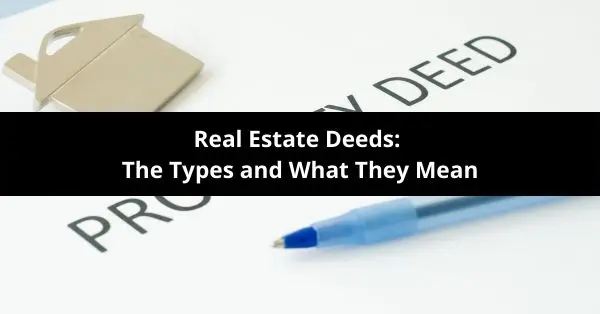Deeds are legally binding documents which transfer ownership of property from one person to another. It’s important for you whether you’re a grantor (the seller) or a grantee (the buyer) to know about the different types of deeds in real estate because each one can protect you during and after the transaction.
Fun fact: There is no template for a deed. But a real estate deed does have to meet certain requirements for it to be legally binding.
The requirements for a real estate deed to be legally binding include the:
- Grantor owns the property (you can help verify this through a title search)
- Document has names of grantor and grantee
- Deed is written on paper
- Description of the property is included
- Signature of the grantor
- Wording that clearly says the property is changing ownership
Once you have each of these requirements complete, the next step is to have the deed notarized and then file it (have it recorded) with the county clerk. But be warned, once a deed is recorded you can’t change it, so make sure that everything on the deed is correct. Common mistakes include misspelled names and on very rare occasions, transferring ownership of the wrong property if the seller owns multiple.
Now that you know what a deed in real estate is and the steps to make it legally binding, lets look at the types of real estate deeds so you know which is the correct one for your situation.
The Types of Deeds in Real Estate
Depending on how you want to transfer property, you can choose from several types of deeds:
- General Warranty Deed
- Quitclaim Deed
- Grant Deed
- Special Warranty Deed
- Interspousal Transfer Deed
- Deed in Lieu of Foreclosure
General Warranty Deed
A General Warranty Deed offers a grantee the most protection. As a grantor you guarantee you own the property and no one else has a claim on it (such as a lender). You also agree to pay legal fees if someone else comes forward saying they own the property, depending on if you have a title insurance policy and what the policy will cover. General Warranty Deeds are what you use in a residential real estate transaction.
Quitclaim Deed
A Quitclaim Deed is exactly how it sounds: you sign away any ownership you have in a property. Quitclaims do not offer the grantee any protections, and good news, they are rarely used in real estate transactions.
Quitclaim Deeds are normally used in a divorce if your ex keeps the house and you want no part of it. You’re giving up any right to that house when you sign a Quitclaim Deed.
Grant Deed
With a Grant Deed you guarantee that any claims on the property you are selling have been disclosed and that you have not sold the property to anyone else. A grantee has no protection from claims dating to before you owned the property.
Special Warranty Deed
Special Warranty Deeds come with all the protections of Grant Deeds, plus one extra which makes them special. If you are the grantee in a real estate transaction, the Special Warranty Deed protects you from any claims on the property including those from previous owners. Grantors use these deeds when they temporarily hold the property, such as after foreclosures.
Interspousal Transfer Deed
Like the name suggests, if you are the grantor in an Interspousal Transfer Deed you are giving the property to a spouse. It’s tax-free and doesn’t require the grantee to pay you money. Interspousal Transfer Deeds are the normal type used when planning your estate, or if your spouse has better credit to refinance your property.
Deed in Lieu of Foreclosure
When you’ve fallen behind on mortgage payments and the lender threatens foreclosure, you can instead choose to file a Deed in Lieu of Foreclosure. This transfers your property to the lender and avoids the difficult process of foreclosure and its negative effects on your credit score. If you find yourself in this situation, you can always find a “we buy houses” company like ours and sell your house for cash as a way to avoid foreclosure.
These are the types of deeds in real estate, what they mean and when you should use which one.


